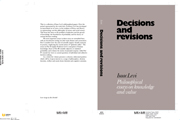Summary
Scientists must make value judgements. The conduct of their diverse activities requires this of them. The kernel of truth in the contrary claim that scientific inquiries are value-free or value-neutral is more accurately expressed by asserting that scientific interests are autonomous. The values which ought to be promoted in scientific inquiries exhibit features distinctive of scientific as opposed to political, economic, moral or aesthetic deliberations. This way of speaking admits that scientific inquiry is valueladen, that every specific scientific inquiry addresses some problem or family of problems and is, as a consequence, goal-oriented, and that the solution which ought to be adopted from among the strategies available is one which best promotes the goals of inquiry.
To concede the value-laden character of scientific inquiry is not to grant the reducibility of the goals and values of scientific inquiry to moral, political, prudential and aesthetic goals and values. The reconstructed version of value-neutrality. I favor denies this reductionist view and insists that scientific inquiries seek or ought to seek to promote values and goals distinctive of the scientific enterprise.
The autonomy of scientific values is compatible with the plurality of human values. Scientists are human beings with personal goals, plans and moral commitments distinct from scientific interests which sometimes compete with the research aims that some human beings also have. Universities, research institutes and other agencies of scientific research have economic, political, educational or other interests distinct from cognitive ones.
Information
- Type
- Chapter
- Information
- Decisions and RevisionsPhilosophical Essays on Knowledge and Value, pp. ix - xviiiPublisher: Cambridge University PressPrint publication year: 1984
